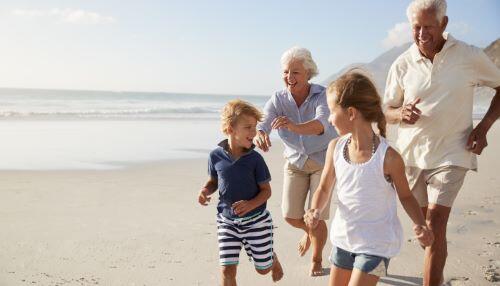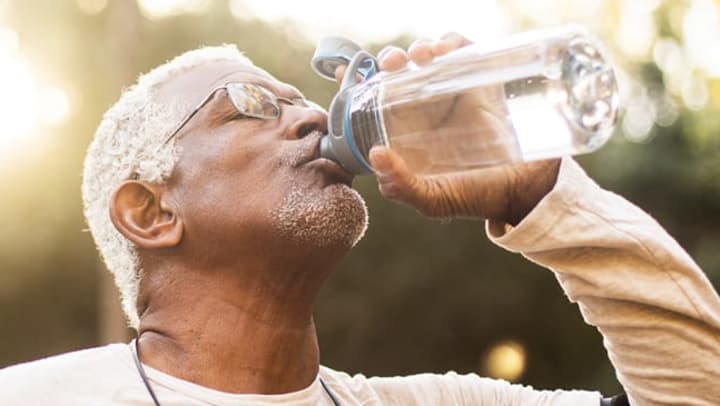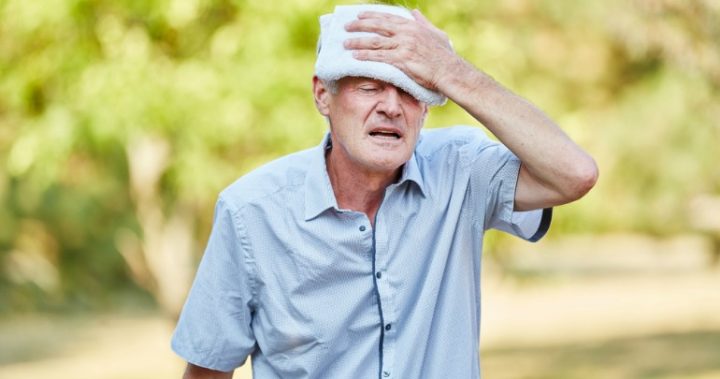
Summer Safety Tips for Seniors
Seniors are more likely to get heat-related illnesses and injuries, especially in the summer months. This is why it's very important to take proper precautions during the summer when most places have it's warmest weather of the year. When we age, our bodies become less efficient at regulating our temperature. Seniors do not sweat as much as younger adults, which is extremely important for heat regulation of the body. We have come up with a list of tips to stay healthy during the hot weather and signs and symptoms to look for, for heat-related illness so you can recognize them before something serious happens.
Stay Hydrated 
This is probably the most important tip for summer safety, stay hydrated. Whether you're at a BBQ with family and friends or relaxing on your back deck, you should always have lots of water with you to keep hydrated. When you sweat, your body is getting rid of liquid and it needs to be replenished to stay healthy. Too much loss of liquid without making up the difference can cause dehydration. When you're dehydrated your body can't properly produce the right amount of sweat to keep your body cool which can lead to scarier medical issues such as heat stroke and heat exhaustion.
Stay Indoors During Extreme Heat
For days when the temperature and humidity combined are in the extreme range (above 90 degrees) it's a good idea to stay inside rather than spending time outdoors. When you're inside during these times try to keep cool by using fans and an air conditioner because it can be just as unsafe in the heat indoors. Take cold showers to cool off if you're hot inside, use ice packs wrapped in a towel to put on your neck, or cold wash cloths on your forehead.
Protect Your Skin and Eyes
Even if it's not bright and sunny while you're outside, you still need to protect your skin and eyes from the UV rays from the sun. Wear sunscreen that has a least SPF 30, however the higher, the better and more protection. Years of getting sunburns not only is painful but can cause skin cancer. Sunglasses protect your vision, make sure they have a good UV filter. For added protect, consider wearing a hat and/or sitting under an umbrella for shade.
Know the Weather Ahead of Time
Make sure you check the weather frequently as the forecasts can change, especially if you have plans for outdoors. Knowing the weather will help you prepare yourself. Make sure you dress appropriately so you won't be too hot if you're going to be outdoors for an extended period of time. Not only do you need to be prepared with the correct clothes but be prepared with the right gear. Bring water bottles, sunscreen, an umbrella (to stay out of the sun), and/or sunglasses or a hat to protect your eyes. A good tip is to create a "summer bag" with all of the mentioned items so you're prepared and ready to go all summer long.
Pay Special Attention in Traffic
Hot summer days can be particularly dangerous for seniors when navigating traffic, whether as pedestrians or drivers. Dehydration, heat exhaustion, or dizziness can impact reaction times and awareness, making it crucial to stay extra cautious. If driving, ensure the car is well-ventilated or air-conditioned, and avoid peak heat hours when possible. Pedestrians should take shaded routes, cross streets at designated crosswalks, and be mindful of increased traffic risks during extreme heat. If an accident occurs due to hazardous conditions or negligence, consulting a personal injury lawyer can help seniors protect their rights and explore legal options.
Know the Signs of Heat Related Illnesses 
-
Dehydration- this occurs when your body loses more fluid than it takes in. Signs of dehydration include dry mouth, tiredness, muscle cramping, feeling dizzy, and/or decrease in or dark urination.
-
Heat Stroke- heat stroke is a very serious medical condition that requires medical help immediately. Signs of heat stroke include fainting, unconsciousness, change in behavior (confusion, agitation, aggression, strange behavior), body temperature 104 degrees+, weak pulse, and not sweating even if it's hot.
-
Heat Exhaustion- this happens when your body can no longer keep itself cool. Signs of heat exhaustion are feeling dizzy, weak, thirsty, nausea, skin feeling cold and clammy, or sweating a lot.
Conclusion
These tips for summer safety will help you get through the summer feeling comfortable and staying safe during heat waves. Extreme heat can be dangerous for the elderly, so check in frequently with your senior friends and relatives to make sure they're safe and healthy. If they don't have an air conditioner or need assistance ask them to stay with you during these times.